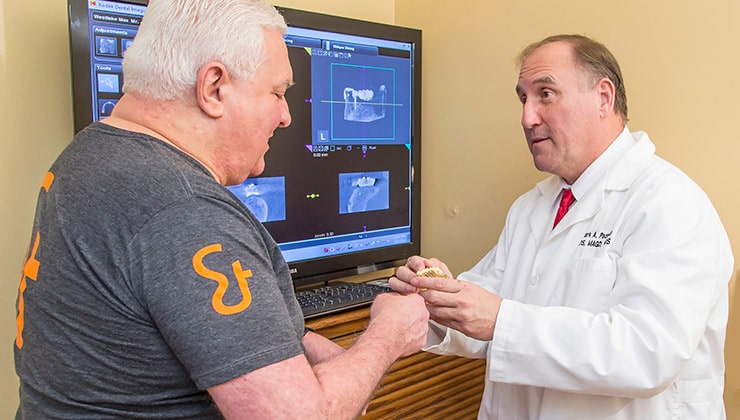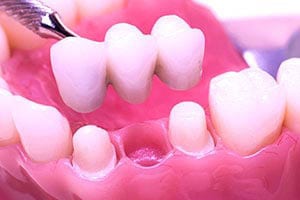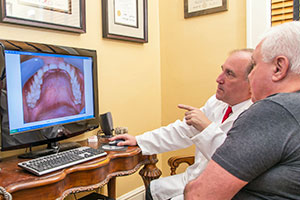The Benefits of Dental Implants

Dr. Padolsky can explain the benefits of dental implants versus other methods of replacing missing teeth.
The modern tooth replacement solution that looks, feels and functions naturally!
- Better Alternative to Dentures
- Implants Vs. Bridges
- Benefits of Dental Implants
- Free Implant Consultation
What are Dental Implants?
A dental implant is a titanium post made to act like a tooth root that is placed in the jawbone. A porcelain crown is placed on top of the implant, supported by a connecting abutment. A dental implant looks, feels and functions like a natural tooth.
Dental implants serve a number of different purposes such as: supporting and stabilizing dentures, adding stability and support to dental bridges, and for partial or full-mouth teeth replacement.Learn more about our Options for Missing Teeth.
The modern solution for missing teeth
 With current advances in modern dental technology, dental implants have become the most preferred and most effective solution for replacing missing teeth. They are favored over dental bridges for single-tooth replacement, and dentures for multiple tooth-replacement.
With current advances in modern dental technology, dental implants have become the most preferred and most effective solution for replacing missing teeth. They are favored over dental bridges for single-tooth replacement, and dentures for multiple tooth-replacement.
Dental implants:
- Look, feel and act like natural teeth. People usually don’t notice any difference
- Are the strongest and longest-lasting replacement for missing teeth
- Let you talk, chew and exert pressure just like with natural teeth
- Don’t require alteration to the structure of adjacent teeth, as with dental bridges
- Deter or prevent bone loss that occurs when teeth are lost
- By filling the gap, they keep adjacent teeth stable and prevent bacteria from accumulating that would lead to gum disease
Minimally invasive Implant procedure
With advanced technology, placing dental implants has become a minimally invasive procedure requiring no cutting or suturing, resulting in little or no post-operative pain or discomfort. Dr. Padolsky uses digital 3D imaging software to do “virtual surgery.” This technology allows him to create a digital surgical template for precise, optimal placement of your implants. He will design your implant to look very natural, complementing the features of your face, while at the same time correcting your bite.
A better alternative to Dentures
For a long time now, dentures have been a popular teeth replacement option for many people because of their affordability. Also, the idea of having surgery may seem frightening to some.
But today, there are many affordable options to replace missing teeth with dental implants and current advances in dental technology have made dental implant surgery minimally invasive.
The disadvantages of Dentures
- Dentures have only 10% or less of normal chewing power, making it difficult to eat food you want and need
- Dentures have to be kept in the mouth using adhesives
- Dentures have to be removed for cleaning
- Dentures cover the roof your palate, interfering with your sense of taste
- Dentures can click while eating
- Dentures encourage bone loss in the jaw bone
The problem with Dentures and neglecting missing teeth
When a tooth is missing the bone where the tooth was begins to recede. In the first year after a tooth is lost, 25% of the bone is reabsorbed into the body and this process continues. Wearing dentures continues this process by irritating the boney ridge where the teeth sit, wearing them down.
Losing bone in the jawbone eventually causes the facial muscles to collapse around the jaw. The height between the tip of the nose and chin progressively decreases, causing the lower third of the face to collapse. This causes wrinkles around the mouth, drooping jowls, sagging skin and thinning lips. The chin also becomes more pointed. A person’s appearance can be aged many years as a result. The best solutions are implant-supported bridges and implant-supported dentures which maintain high chewing pressure and preserve bone.

When the tooth roots are left un-replaced, as with regular dentures, the face can begin to sag as bone mass deteriorates. Dental implants can prevent this from occurring.
Dental Implants vs. Dental Bridges

With a dental bridge, the patient’s healthy teeth need to be altered to hold the bridge in place.
A bridge consists of porcelain crowns supported or anchored by adjacent teeth that have been capped. It is used to replace one or more missing teeth.
A bridge requires two usually healthy teeth to be cut down, which is not an ideal way of replacing a missing tooth compared to a dental implant. Bridges tend to have short lifespans, from five to ten years, compared to a dental implant which can last a lifetime with proper care. So while a bridge can sometimes be more economical initially, in the long run a dental implant can cost you less.
Benefits and advantages of Dental Implants
 Dental Implants can last a lifetime
Dental Implants can last a lifetime
Dental implants are made of durable titanium, a non-corrosive, body-friendly, long-lasting metal. Implants are subject to the same periodontic issues as natural teeth, however, and require good oral care (daily brushing and flossing) and regular professional cleanings.
Dental Implants behave like natural teeth
Once an implant is placed, most patients can’t tell the difference between their natural teeth and the implant tooth. Not only do the implants blend-in with their natural teeth, they can eat with full chewing power, and can brush and floss normally as well.
Dental Implants prevent bone loss
Bone in the jaw deteriorates where there is no tooth. This is because the bone requires the pressure and stimulation of chewing to maintain its density. Implants act as natural teeth and provide that necessary stimulation.
Dental Implants keep adjacent teeth stable
The gap caused by a missing tooth can destabilize adjacent teeth, causing them to shift towards the gap. This pulls your teeth out of position and can affect your bite and your ability to chew. Dental implants fill in the gap left by a missing tooth and prevent this from occurring.
Dental Implants can help keep you free of gum disease
Gaps between teeth can act as traps for food and bacteria that can lead to gum disease. For this reason, dental implants can help prevent gum disease.
Free Dental Implant Consultation
 Dental Implants offer an effective, long-lasting solution for missing teeth. Find out if you’re a candidate for dental implants and what options are available to you. Our special offer includes:
Dental Implants offer an effective, long-lasting solution for missing teeth. Find out if you’re a candidate for dental implants and what options are available to you. Our special offer includes:
- Consultation with the doctor
- Discuss treatment options
- Learn more about dental implants
- All your questions answered
To make an appointment, call 404-476-5504 or click here to request an appointment online.


 Dental Implants can last a lifetime
Dental Implants can last a lifetime